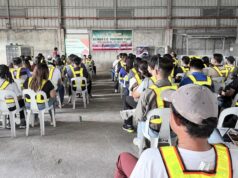“In the poorest countries, corruption levels can mean the difference between life and death, when money for hospitals or clean water is in play,” Transparency chairwoman Huguette Labelle said in a statement, describing the combination of corruption and poverty as “an ongoing humanitarian disaster.
The TI’s perception survey result is nothing new. On March 14 last year, the Philippines also topped the charts in another perception survey by Political & Economic Risk Consultancy (PERC), which ranked the country as the most corrupt among thirteen nations in Asia.
Through decades in journalism, I knew years ago the country was headed for the worse in graft and corruption. I started working as government writer in the 1970’s, left the government in 1992, but continued covering government to the present.
In and out of government, I’ve seen politicians rise and fall through plunderous stints, though some die questionably rich and very much grieved over by many ex-constituents over expensive coffins; I’ve witnessed ordinary government employees cheat, get away with it, launder their loot, and straighten out their lives with their families in apparent perpetual comfort whose roots, eternity will attest, revolve around theft of public funds.
“In the poorest countries, corruption levels can mean the difference between life and death, when money for hospitals or clean water is in play,” the TI said
This truth finds reality in everyday lives of folk in any area, such as in Barangay Quebiawan in San Fernando City where barangay officials whose being enmeshed in conflicts revolving around alleged fund misuse have led to many problems affecting local folk.
A resident has been paying me a visit where I write this piece, begging me to ventilate his outrage over Quebiawan political melee after his grandchild fell victim to dengue mosquitoes. The ninth dengue case so far this year in the barangay, he noted, putting the blame on barangay officials obsessed with clawing each other than implementing widespread cleaning campaign to rid their barangays of mosquito breeding grounds.
Colleagues who arrived recently from a four-day visit to Kuala Lumpur had nothing but laments for our poor country. The Malaysian capital is neat and obviously progressive, a far contrast to Philippine cities dotted with shanties and littered here, there, almost everywhere with garbage. I haven’t seen where Kuala Lumpur ranks in the TI survey of 180 countries, but judging from what my colleagues tell me, it’s somewhere among the short list of countries with good governance.
One of the downs of visiting nearby foreign cities is that lament sets in as one drives home from the airport. The contrast is often stark after arriving from such Asian cities as Taipeh, Seoul, Macau, Hong Kong, Bangkok, Kuala Lumpur.
It crossed my mind that the government should come out with a program to allow lawless jeepney drivers, corrupt small government employees, wayward policemen, and others of such kind a free three-day visit to, say, Kuala Lumpur to make them realize how much their erring makes the difference between Malaysia and the Philippines.
Perhaps, the change can start from down, going somewhere up, since it seems obvious that many people up, such as congressmen who have seen greater cities, have no intention of reforming despite their envy of progress in foreign lands where their congressional variety is rarity.




